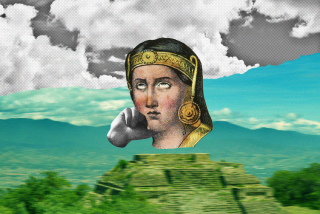Letters: Columbus’ contemporaries were no slouches
- Share via
Re “Curiosity set sail with Columbus,” Opinion, Oct. 13
Far from being the cause of prying the European imagination loose from the church, Christopher Columbus’ voyages were the consequence of established European curiosity and technology.
The interaction with the Muslim world in the 11th and 12th centuries brought back to Europe mathematics, medicine and the knowledge of Greek philosophy. Fibonacci’s “Liber Abaci” dates to 1202, and the Polo family (of which Marco is but one member) traveled to China as early as 1261. The Hanseatic League was created in 1358 to support travel and trade in the Baltic Sea, and people from the maritime republics of Pisa, Genoa, Amalfi and Venice sailed the Mediterranean Sea as early as the 11th century.
Columbus’ voyages came after Giotto, Dante, Masaccio, Donatello, Botticelli, Leonardo and others of equal artistic fame. Johannes Gutenberg invented his printing press around 1450. And yes, Columbus’ voyages were supported by Spain’s very Catholic Queen Isabella.
Paolo Giacomoni
Rancho Palos Verdes
Joyce Appleby makes the interesting point that the real importance of Columbus’ voyages was “their central role in prying loose European curiosity from the vise put in place by the medieval [Roman Catholic] church.”
Sadly, for much of Europe, this renaissance was only temporary. A little more than 100 years after Columbus arrived in the New World, the Roman Inquisition had Giordano Bruno burned at the stake for heresies such as claiming the sun was in fact a star.
In 1633, with Bruno’s execution as a precedent, the church forced Galileo to recant his assertion that the Earth went around the sun. Galileo died in 1642, the same year that Isaac Newton was born in England.
For two more centuries curiosity was frozen in Catholic Europe while the baton of empiricism passed to those countries in northern Europe where the Reformation had freed scientists from persecution by religious authorities.
Cyril Barnert
Los Angeles
I wish to thank professor Appleby for the pleasure she provided me in her historical narrative about the discoveries celebrated on Columbus Day. Regardless of one’s opinion of his contribution to the New World, Appleby’s introduction to this part of our past was compelling.
Had I been her student at UCLA, I might have learned to love history.
Victoria Lee-Jerrems
Encino
ALSO:
Letters: Re-open Angels Flight
Letters: South Dakota’s cold day
Letters: ICC has a role to play in Africa
More to Read
A cure for the common opinion
Get thought-provoking perspectives with our weekly newsletter.
You may occasionally receive promotional content from the Los Angeles Times.










